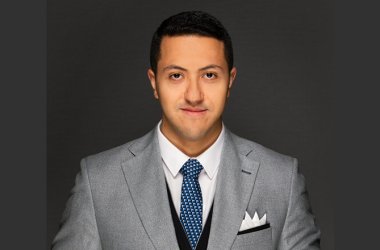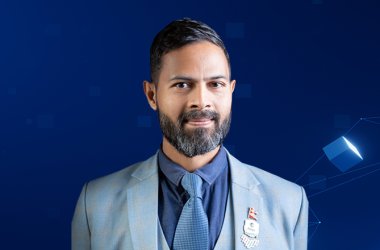CNME Editor Mark Forker spoke to Padam Kafle, Head of IT and Innovation at Aster DM Healthcare, to learn more about how artificial superintelligence can create a more equitable healthcare system for all – and how tragically losing his brother to acute kidney failure at just 26, has inspired him to use technology for the brave and bold vision of extending human life.

Padam Kafle is an IT leader on a very different mission to most of his industry peers.
He shares common ground with a lot of technologists from the standpoint that he wants to transform the industry that he operates in – which in this case happens to be healthcare.
However, his lofty aspirations and bold ambition to completely revolutionise the healthcare industry is driven by a very personal tragedy.
Tragically, Kafle lost his brother in 2007, at the tender of age of 26, due to acute kidney failure.
However, as he pointed out with a greater focus on prevention then his death was avoidable, and ultimately the loss of his brother lit a fire within Kafle that set him on a path to transform the healthcare industry.
According to Kafle, the current healthcare system globally is in the business of treating illnesses, whereas it needs to be focused on preventing illness, and that traditional cultural mindset within the healthcare industry needs to be completely reset.
In 2017, Kafle was appointed as the Head of IT and Automation at Aster Hospitals UAE.
He spearheaded strategic transformation across 27 facilities in the UAE and Oman, and developed a reputation as a ‘digital health innovator’.
Kafle holds an MBA in Innovation and Change from the University of Liverpool, and in January 2024, began studying for a Doctorate in Artificial Superintelligence in Healthcare from the Guglielmo Marconi University in Rome.
We kickstarted the conversation by examining how the healthcare industry needed to adopt a preventative approach to medicine, and move away from the current status quo, which is just a system that treats illness.
“My CEO would often say to me that we are not in the business of healthcare, we are in the business of sick-care, and that really struck a chord with me. When I did my MBA from the University of Liverpool, AI was not in vogue to the extent as it is now. However, when I decided to pursue my doctorate two years ago, my purpose was to find out how can we really transform the healthcare industry, and create a system that was focused on preventative care, as opposed to prescribed care following an illness,” said Kafle.
Kafle conceded that for many people the word superintelligence is just a buzzword, but he believes it has the power to radically overhaul the healthcare system.
He highlighted the limitations of current generative AI models, which are primarily command-based, and lack the ability to assess individual needs.
“Superintelligence to me is having the ability to predict and prevent something before it happens. I mean that is just such a powerful thought and concept, but that is what superintelligence can provide for medical practitioners. The open AI models that are currently available on the market are very good, but at the end of the day, they are command-based, so ultimately they are limited and don’t have the capability to assess what is my need,” said Kafle.
Kafle highlighted that many diseases are hereditary, and stressed the need for the healthcare system to be proactive in order to deliver preventative healthcare.
This is the area where Kafle believes superintelligence can come to the fore to build models and data around a person’s family health history, to predict when they may be at risk of a certain disease.
“Superintelligence can extract and pull together data that can build models that can predict when you may be at risk of heart disease, diabetes, hypertension, and other illnesses based on a comprehensive overview of your family’s genetic history. This is a gamechanger. For example, we know that 1 in 3 globally are impacted by cancer, and there are so many different types of cancer. However, by the time you may discover you have cancer then it may already be too late, but if you had a superintelligence model that can predict this, and catch the illness early before it starts spreading, how many lives can we save? It is so powerful, and I’m only halfway through my doctorate, but I’m confident that I’ll finish my research by the end of 2027,” said Kafle.
Kafle then outlined how he had spoken to a start-up company that said they had developed a solution that could potentially prevent mental health issues, which again globally, is increasingly becoming a major problem.
However, unlike building models around heredity illnesses, and patterns related to your family history, when it comes to the mental health, it is even more personalised, and Kafle highlighted that the biggest issue here is related to data and privacy.
It gave Kafle the idea to pivot into the mental health space, and that led to him filing a patent with the Dubai Ministry of Economy for a Web3 Healthcare Wallet.
“Mental health is a huge challenge globally, but we can see in Dubai how big a problem it has become, and a lot of research has linked the decline in our mental health to our relationship with social media platforms. When you are suffering from anxiety, or depression then your behaviour changes, but it is not always easy to spot, but if you connect all your social media accounts to a digital healthcare wallet, then it may flag something if you post something that they can recognise as being somewhat out of character for you. However, the big question always comes back to privacy, who has access to my data, and is it secure? So, I decided to file a patent with the Dubai Ministry of Economy for the region’s very first Web3 Healthcare Wallet,” said Kafle.
Kafle said the healthcare wallet would be run on a decentralised system, where the user was in complete control of their data, stressing that in order for it to be a success then privacy had to be rooted in its foundations as product.
“The Web3 Healthcare Wallet is the first of its kind, and is a concept that combines blockchain and Web3 technology to provide complete control over personal health data. The healthcare wallet is run on a decentralized system, where users can choose what data to share and with whom. We are also currently examining the potential for wearable technology, such as bracelets, or smart rings, to track user behaviour, which would greatly contribute to the healthcare wallet in a holistic way. Privacy is paramount to us, and the Web3 Healthcare Wallet enables secure, tokenised patient data on the blockchain – setting new standards in accessibility, trust and privacy,” said Kafle.
Kafle has created PAHSI, which stands for Personalised Artificial Healthcare Superintelligence – and ALIF, which stands for Advanced Life-Integrating Intelligence Framework.
These are going to be the two main engines that Kafle believes can fundamentally change the healthcare industry.
Kafle hopes he can cultivate long-term partnerships with big tech players such as Microsoft and Amazon for the data hosting and storage that will be required, as the datasets needed are going to be massive.
“I believe that superintelligence will take the wheel, but it not here to replace doctors, but instead to lift us higher. In a world rapidly shaped by AI, it’s time we envision a future where intelligence doesn’t dominate, but elevates. A future where we heal faster and live longer. PAHSI and ALIF have been designed as intelligent systems that were not just built to solve problems, but to fundamentally redefine care. This is going to require a hell of a lot of data, so that’s why I am proactively engaging with the big hyper-scalers like AWS and Microsoft, because when I’m talking about data, it’s in terabytes. The aim is to track the entire health history of your family, and then in real-time monitor and analyse your behaviour to see what your patterns are, so that is going to require huge datasets, so we need to get the major tech players onside to become key partners in our mission to transform the global healthcare industry,” said Kafle.
Kafle believes that PAHSI and ALIF will be affordable technology tools that are accessible for everyone, and not just the few.
His vision is to deliver world-class proactive and preventive healthcare through these two frameworks, but the cost is secondary.
Kafle wants healthcare to be accessible to everyone, but he knows all too well that the healthcare system globally is an unfair one.
Kafle tragically lost his brother at the tender age of 26 in 2007, a death looking back he believes was preventable, and this devastating loss is fuelling his mission to transform the healthcare sector.
“I lost my brother in 2007, when he was just 26 from acute kidney failure. It was devastating. The treatment process for kidney failure is not straightforward, trying to get a match for a kidney transplant is complex, and then the medication that you need to take is costly. So, unfortunately, I wasn’t able to save him. Losing my brother was like a sliding doors moment for me, when I realised that the healthcare industry isn’t accessible for a lot of people, including my brother – and I thought how can we change this inequitable system we have. Essentially, we didn’t have the money to pay for a kidney transplant, on the salary I was earning at the time it was just next to impossible, but this experience triggered my burning desire to make the healthcare industry both accessible and affordable for everyone, and I believe my PAHSI and ALIF frameworks can lay for the foundations for this transformation,” said Kafle. 
Kafle believes that PAHSI and ALIF with superintelligence at their core they we can avoid such necessary deaths in the future.
Again, going back to his underlying point that we need to think preventively and use technology to build models and systems designed to detect illness.
However, Kafle conceded that it isn’t just him championing the role of superintelligence in healthcare, but he does believe that fundamentally his research will improve humanity.
“The role of superintelligence is going to become more pivotal and palpable in our day-to-day lives. I know to some people it sounds like something from a sci-fi movie, but it’s already here, and in five years our society is going to be a lot different, and I believe our healthcare industry will look very different. I am also acutely aware of the fact, that it’s not just me looking at the role of superintelligence in healthcare, there is an ecosystem of partners and players. It’s not just my invention, or innovation we are talking about. The speed at which technology is transforming is only going to accelerate and the power behind some of these models is phenomenal. I do believe that my research is going to be for the better of humanity,” said Kafle.
Kafle stressed that there is no magic pill one can consume to guarantee you’ll live to 100, and said if we really want to extend life expectancy then our behaviours have to change, and again our own health has to be our priority and we need to be proactive.
“I go to a lot of medical tech conference, and time and time again, people will talk about longevity. However, the simple fact of the matter is that if you want to extend people’s life expectancy then there is huge work that you need to do. There is no medicine that you can take that can let you live until you’re 100. You have to change your behaviours and you have to make your own health a priority, we can’t wait until we get sick to then kickstart our own health journey. My grandfather lived until he 91, the day that he died he walked 3kms into the local village from his house, he was still very active and physically fit for a man in his 90s, so again it all goes back to behaviours. Technology can be a bridge here, we can use technology to guide us to better understand our own health, and support your efforts to extend your life expectancy. Superintelligence can play a key role in making you aware, and predict and prevent when you may get sick, but it still requires you to change your behaviour if you really want to stay healthy,” said Kafle.
He did concede that initially that there was some resistance from doctors towards AI, but when they witnessed firs hand how the technology was actually empowering them to work more effectively then that reluctance to adopt the new AI technologies subsided.
AI technology is already transforming the healthcare sector, and Kafle pointed to the incredible success of their Gen AI assessment tool across Aster Hospitals in the UAE, which has reduced waiting times in the emergency department by 70%.
“We implementing generative AI technologies at multiple locations across our hospitals in both the UAE and Oman. Initially, we faced some resistance from doctors, who were concerned about losing their jobs. However, by showing the medical practitioners that the introduction of the technology could lead to increased efficiency and revenue, they were able to convince the doctors to adopt the technology. In addition to this, we also had huge success with our generative AI-powered assessment tool, which has reduced waiting times in our emergency department by 70%,” said Kafle.
Kafle conceded a wonderful conversation, be reinforcing his belief that his research and his frameworks can better humanity, and radically transform a healthcare system that drastically needs an overhaul in order to create a fairer and more equitable healthcare industry.
“My doctorate and research will be complete by 2027, and I believe that my research can contribute toward the construction of a new healthcare system, one that is rooted in fairness and equality. The current system is broken, and we need to use these ground-breaking technologies to create an industry that is steeped in prevention as opposed to treatment. I believe that PAHSI and ALIF can lay the foundations for this, and I also believe that our Web3 Healthcare Wallet can also help tackle mental health problems. We are only at the beginning of this journey, but we can by leveraging the power of superintelligence to transform the healthcare industry to ensure that healthcare is accessible for all,” concluded Kafle.





